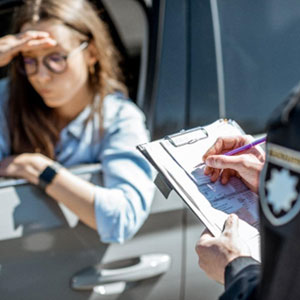Understanding The Traffic Ticket Process In San Francisco

- What to expect with a traffic ticket in San Francisco.
- How to contest a ticket and the consequences of pleading guilty.
- How a not guilty plea protects your rights by leveraging the burden of proof.
What’s The Process For A Traffic Ticket In San Francisco?
In San Francisco, when you receive a traffic citation, the officer involved may require you to appear in court, and this is typically mentioned at the bottom of the citation document. This citation will specify one of two options: either a set court appearance date, or instructions to visit the courthouse before a certain date to schedule a court appearance. If the citation mandates a court appearance by a specific date, it’s important to go to the courthouse to arrange the date for the arraignment.
During the first court appearance, known as the arraignment, the court will ask for your plea, giving you the options of guilty, no contest, or not guilty. If you plead guilty or no contest, you may receive immediate sentencing, possibly with the option of attending traffic school. On the other hand, a not guilty plea will lead to the scheduling of a trial, where the officer involved will be subpoenaed to testify.
It’s important to note that in some California courts, choosing a not guilty plea during arraignment could make you ineligible for traffic school. During the trial, the officer will present their version of the events and try to prove the allegation of your legal violation. After the officer’s testimony, you have the opportunity to cross-examine, followed by presenting your defense, which may include witness testimonies and supporting evidence.
Upon the conclusion of your defense, the court will deliberate and issue a verdict. If found guilty, a fine and corresponding punishment will be determined. It’s essential to highlight that for infractions, incarceration is not a potential outcome.
How Long Will It Take To Resolve My Traffic Ticket?
The progression of a traffic case typically moves faster than that of a criminal offense, whether it’s a misdemeanor or a felony. Despite this relatively quicker pace, the right to a speedy trial is still preserved, though it’s often waived. If you choose not to waive this right, the court is required to schedule your trial within 45 days after your arraignment. Failing to meet this timeframe could lead to case dismissal.
An alternative option is pursuing a trial by written declaration, which provides an additional way to contest the citation but may potentially prolong the case’s resolution. On average, it takes about six months from the issuance of the citation to the conclusion of the trial for a complete adjudication of a traffic case.
What Is An Arraignment In A Traffic Case?
In the context of a traffic case, an arraignment is the point at which you are officially informed of the charges against you and your constitutional rights. After this briefing, you or your legal representative must decide whether to plead guilty, no contest, or not guilty.
If you choose a not guilty plea, you will also need to decide whether to pursue a speedy trial or waive this right. The arraignment concludes with the presiding judge scheduling a future court date.
Must I Attend The Arraignment In A Traffic Case?
If you have retained an attorney for your traffic arraignment, you may not need to personally attend. Your attorney is authorized to represent you throughout all stages of the traffic case on your behalf.
I Think I May Actually Be Guilty. So, Why Are We Pleading Not Guilty?
Choosing a not guilty plea does not imply innocence; instead, it places the burden on the government to prove their case beyond a reasonable doubt. In the subsequent trial, it’s the officer’s responsibility to appear in court, establish the legal violation, and meet the evidentiary burden. If they fail to do so, the result is a mandatory not guilty verdict.
How Many Points Will A Traffic Ticket Add To My Record?
In California, the majority of traffic violations are considered one-point offenses, with some exceptions. Certain violations are exempt from accruing points, meaning you don’t have to attend traffic school for point removal. On the other hand, a few violations, like reckless driving, DUI, driving with a suspended license, or excessive speeding, result in a two-point penalty.
It’s essential to note that the accumulation of points is based on the highest point violation per citation, not a cumulative total. Therefore, if you receive citations for both reckless driving (two points) and speeding (one point) simultaneously, it will result in a two-point addition to your driving record, not three.
How Do I Know If I’m Eligible For Traffic School?
Eligibility for traffic school in California is contingent upon possessing a valid driver’s license, receiving a citation for a moving violation, and not having attended traffic school for a prior violation within the preceding 18 months
For more information on Dealing With A Traffic Ticket In San Francisco, an initial consultation is your next best step. Get the information and legal answers you are seeking by calling (415) 728-9982 today.

Call Now For A Personalized Confidential Consultation!
(415) 728-9982



